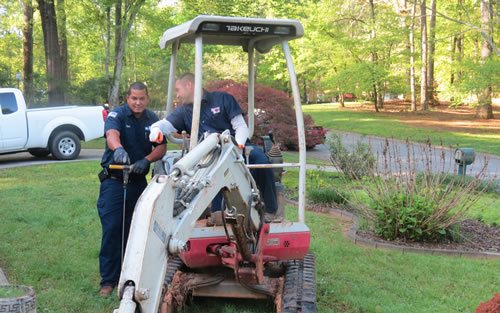Oct 04, 2023
Can a Leach Field Be Restored?
For keeping the area surrounding your home clean and healthy, a functional septic system is essential. The leach field, a crucial element responsible for processing and spreading wastewater from your septic tank into the soil, is at the center of this system. Leach fields are susceptible to deterioration or clogging over time, which can result in issues like sewage backups, unpleasant aromas, and even environmental contamination. The good news is that by combining septic tank pumping, septic tank repair, and septic tank installation services offered by a reliable business, a leach field can frequently be brought back to full performance.
In this blog post, our professionals from Septic Blue of Raleigh will explore the process of leach field restoration and discuss the key elements involved.
Understanding the Leach Field
Understanding the function of a leach field inside a septic system is crucial before beginning any leach field restoration. The leach field, often referred to as a drain field or an absorption field, is where wastewater treatment comes to an end. It enables septic tank effluent to seep into the soil where it is broken down by natural processes, leaving behind clean water that seeps back into the groundwater.
Signs of Leach Field Problems
Over time, leach fields may have a variety of problems that may impair their functionality. Typical indications of issues with leach fields include:
- Slow Draining Fixtures: Sinks, toilets, and showers that drain slowly could be signs of a problem with the leach field.
- Sewage Odors: Septic system issues may be indicated by foul odors in your yard or home.
- Wet Regions or Puddles: A failing leach field can be indicated by standing water or excessively moist patches in your yard.
- Backups and Gurgling Pipes: It's a clear symptom of an issue when wastewater backs up into your house or makes gurgling sounds in the plumbing.
- Lush, Green Grass: While this may seem counterintuitive, an unusually healthy and green patch of grass above the leach field could suggest a problem. It suggests that the soil is receiving an excessive amount of moisture and nutrients, possibly as a result of a malfunctioning leach field.
The Restoration Process
It's critical to speak with a qualified septic firm when dealing with leach field issues in order to receive an accurate diagnostic and suitable remediation strategy. Here's a step-by-step overview of the leach field restoration process:
- Inspection and Assessment: To determine the root of the issue, a certified specialist will evaluate the septic system, including the leach field. This evaluation assists in deciding whether replacement is required or if restoration is feasible.
- Septic Tank Pumping: Septic tank pumping is sometimes the first step in recovering a leach field. This lessens the burden on the leach field by removing extra solids and scum from the tank.
- Repair and Maintenance: Repairs and maintenance may be required, depending on the problem found during the inspection. This can entail replacing infiltrators or distribution boxes, repairing broken pipes, clearing clogged distribution lines, etc.
- Bacterial Additives: To revive microbial activity in the leach field, a septic business may occasionally advise using bacterial additives. These additives can aid in the decomposition of organic matter and the restoration of the soil's organic absorption capacity.
- Rest Period: The leach field can require a rest period to recuperate after any required repairs and maintenance. Homeowners should be careful not to overuse water at this time to avoid overloading the system.
- Ongoing Maintenance: Regular septic tank pumping and maintenance are essential to prevent future leach field issues. To ensure that their septic system keeps working properly, homeowners should adhere to a suitable maintenance schedule.
Need a Reliable Company?
Are you in need of a reliable septic company? Luckily, we at Septic Blue of Raleigh have dedicated workers ready at your service. Contact our representatives for more questions.
